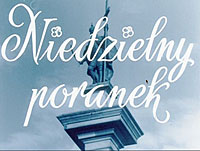 Niedzielny poranek
Niedzielny poranek
Poland, 1955, colour, 19 mins
Andrzej Munk’s second film from 1955 is very different from the first, The Men of the Blue Cross (Błękitny krzyż), and marks another decisive break with the tenets of Socialist Realism that had dominated his early work – in particular, the sardonic humour is much more in line with reports of Munk’s own personality. Nominally, it’s a portrait of a Sunday morning in Warsaw, as primarily seen from the point of view of a number of people travelling on the 133 bus. The narration pays lip service to the notion of highlighting the work of transport staff (“They must stay on duty so that we may take our Sunday ride to the park”), but the tone is low-key and jokey, the commentary as likely to adopt the first person as anyone else’s viewpoint.
We first see Warsaw waking up, the streetlights extinguishing themselves and one or two hardy individuals setting out early. The music by Munk’s regular composer Jan Krenz picks up speed and adds a jaunty piano motif as a bus disgorges a load of transport workers, and reveals that the narration is reading the thoughts of a blond bus driver. He’s waiting for his bus to emerge from a thorough clean from the depot before boarding it with a woman at whom he’s been making eyes all morning – his conductor.

While bleary-eyed, still pyjama’d citizens can be glimpsed through their windows, their more energetic counterparts cycle en masse or get the bus. Not only is a seat guaranteed at this time of the morning, but also a lively chat with the conductor. Jealous, the driver speeds up the bus, almost winging a passing car, to shorten their conversation. This is one of many mischievous touches that would have been unimaginable in po-faced propaganda like Munk’s strictly party-line Destination Nowa Huta! (Kierunek Nowa Huta, 1951), another being the moment when the driver deliberately vibrates the bus while his colleague is applying her make-up (though here she has a speedy revenge). They’ll spend much of the rest of the film winding each other up in various ways: she seems distinctly cooler towards him than vice versa, though he has plenty of attractive young passengers to chat up.
Munk then shifts to a study of these passengers: the man reading another’s newspaper over his shoulder, the woman who’s lost her ticket when asked to produce it during an random inspection, two young boys who time their exit to perfection as the inspector boards, the woman who sits in the seat reserved for mothers with children, at the expense of a genuine child-carrying parent – but he’s a father, so isn’t catered for – at least not until a bevy of Paddington Bear-style hard stares from fellow passengers persuades her otherwise. A man waits anxiously for his beloved by a bus stop, while another – a Hitchcockian cameo from Munk himself – drops off to sleep and nearly misses his stop.

Along the way, Munk also gives us a tourist-guide view of Warsaw, the still scaffolding-bedecked Culture Palace, the popular meeting-point of Zygmunt’s Column by the Royal Castle, promenading citizens, gossiping women (“They haven’t seen each other for ages – not since last night”), tree-lined avenues, squares and parks. Witty trompe l’oeil effects include a bus apparently caught in a downpour (it’s being cleaned) and a hand seemingly about to pick a pocket (it’s a woman alerting a friend to her presence). The bus runs alongside a tram, and two of its younger passengers smile shyly at each other – later, the man will ask the driver to slow down at the exact point when the tram rounds a corner, so he can switch vehicles.
“What is this film about?” asks the narrator at the end. Nothing much, he disarmingly admits. But his second question, about whether we had a good time on the bus, is answered far more positively. In particular, the brief coda is a model of deftness compared with the stentorian propaganda of both Munk’s earlier work and the admonishing Are You Among Them? (Czy jesteś wśród nich?) – the narrator draws attention to the youth of the driver and conductor, and then lets them on their way. Without spelling its message out, the film becomes an optimistic paean to the importance of young Poles in rebuilding their city and ensuring that it functions smoothly, its use of humour rather than sledgehammer ideology ensuring that it lingers far longer in the mind. It duly won many international awards, including prizes at Edinburgh and Mannheim as well as Warsaw.
- Director/Script: Andrzej Munk
- Camera: Romuald Kropat
- Editing: Halina Kubik
- Narrator: Kazimierz Rudzki
- Sound: Zbigniew Wolski
- Music: Jan Krenz
- Production Manager: Wilhelm Hollender
- Production Company: Wytwórnia Filmów Dokumentalnych (Documentary Film Studio)
The film is included on PWA’s Polish School of the Documentary: Andrzej Munk double-DVD set (Region 0 PAL). Once upon a time, it was in full colour, but fifty years of fading has left it mostly in blue-tinted monochrome with the occasional hint of red and green. It’s certainly not unpleasing to the eye, but it looks much more stylised than I imagine Munk intended. The sound is, as ever, typical 1950s mono, but with no technical problems to speak of. The English subtitles are mostly fine – the meaning of a couple of untranslated sentences can be worked out from the context. Online commentary is provided by this Culture.pl overview of Munk’s career, which briefly mentions One Sunday Morning.